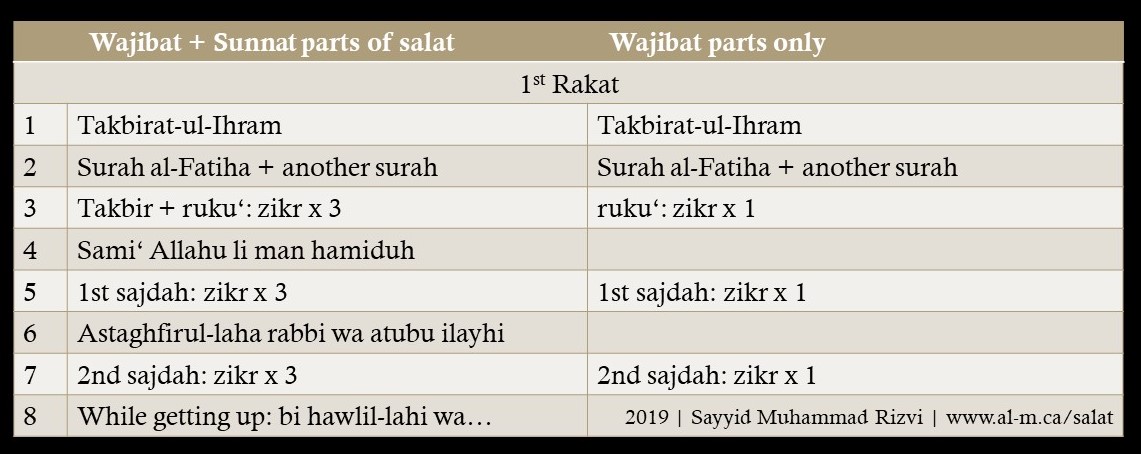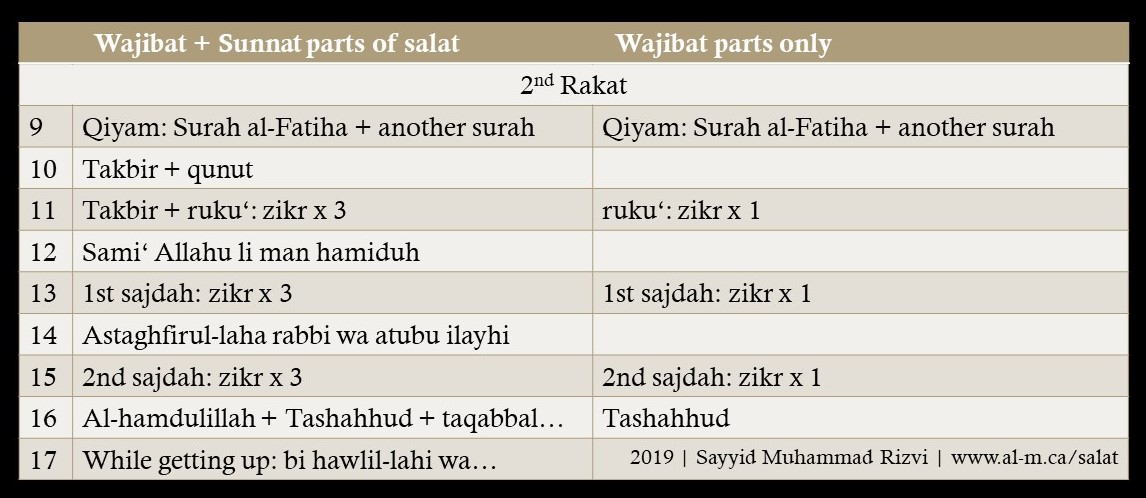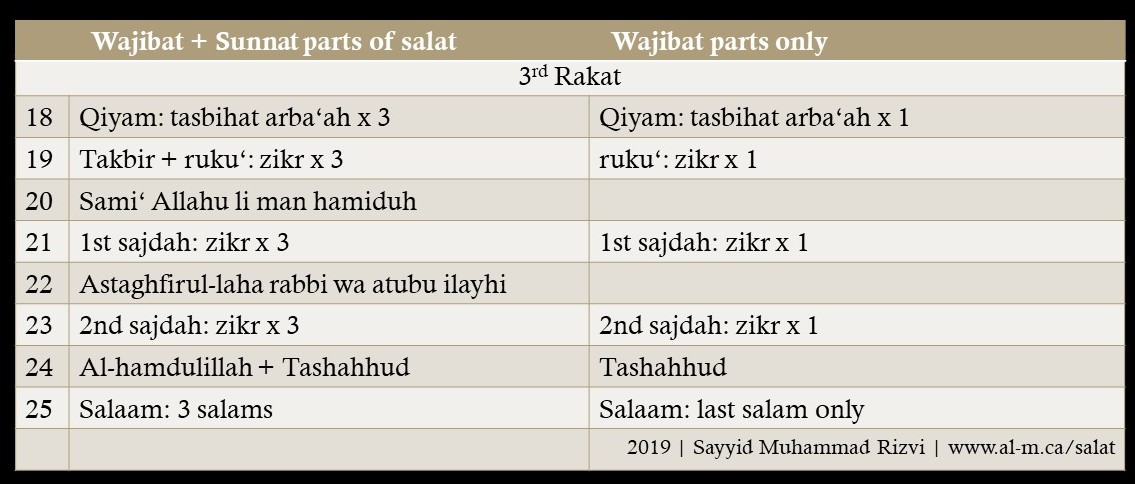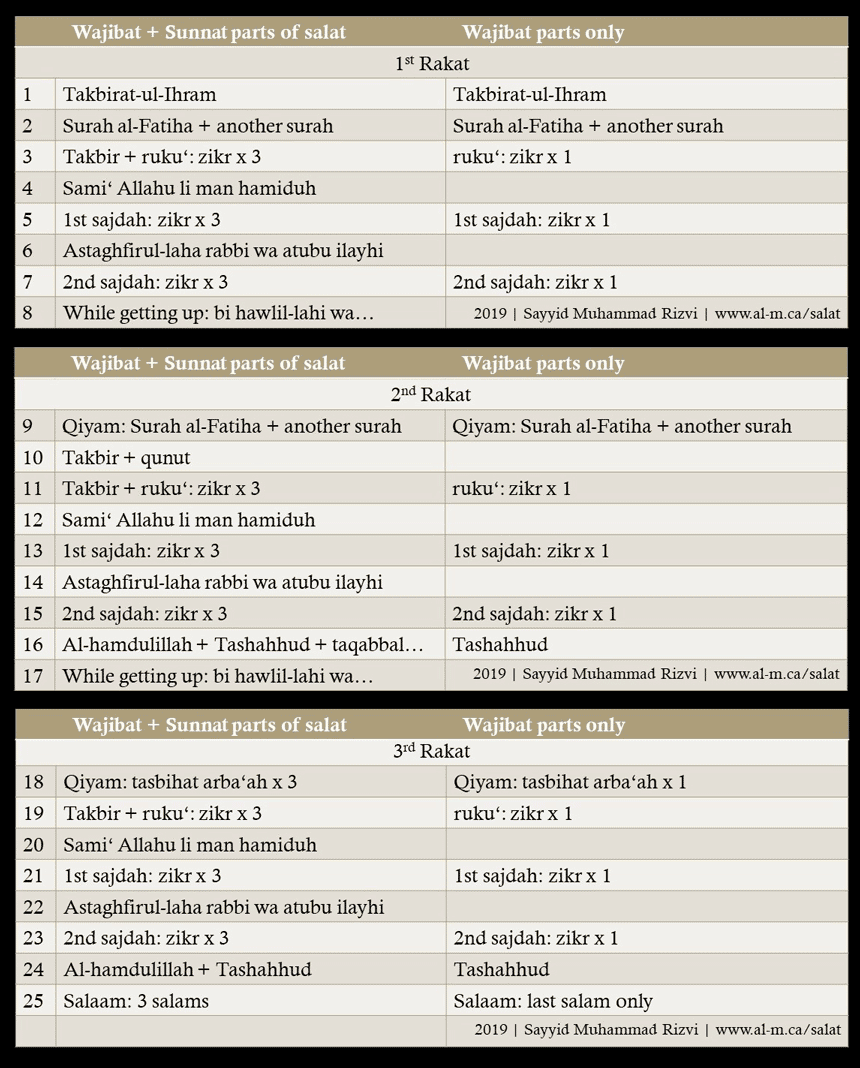Salat Rulings
On this page you will find various useful tools regarding Salat, and many common issues which people face. Please choose which option you’d like to view:
This section covers doubts in the number of raka'at you've prayed, doubts in various actions of Salat, what you can use for Sajda, & what to do about najasat.
Remedies
This section covers Sajda-e Sahw & Salatu 'l-Ihtiyat which are used in the above doubtful situations
Condensed Salat Method
Condensed method of prayer, useful for covering qadha salat, or under time pressures.
Salat & Travel
This section covers praying qasr from the GTA, Qibla directions on your flight, Qibla from any global location, Qasr Salat information, and determining whether you need to fast during travel.
Various Types of Doubts in Salat
If you encounter doubts regarding which rakat you’re currently in, the following form will help you remedy the situation.
Click on the button which relates to the number of rakats you’re having a doubt about.
Salat is invalid
Action: Immediately stop the prayer and simply start again.
Salat is invalid
Action: Immediately stop the prayer and simply start again.
If you encounter doubts during your salat regarding various actions or recitations, the following form will help you remedy the situation.
Note that the term ‘Munafiyat’ refers to any action which invalidates the prayer. (ie looking away from Qibla, talking, walking etc.)
Click on the button which relates to the issue you’re having.
Qara’at refers to the recitation of Surahs during Qiyam.
You know you forgot it:
You have doubts:
Note that Qunut is not a wajib act.
You forgot to perform Qunut but you:
This is the one second moment of standing, after Qara’at/Qunut, before bending for Ruku
General ruling: Knowingly, or unknowingly, adding or forgetting any Ruku, invalidates the prayer. However, if you have:
While going to Ruku, you accidentally go towards Sajda position:
Forgot 1 Sajdah within the:
Forgot 2 Sajdah within the:
Forgot first Tashahhud. If you remembered:
Forgot last Tashahhud. You remembered after salam and:
If you have any doubt whether Tashahhud was performed properly, at any moment – ignore it
Forgot Salam but remembered:
Note that if none of the permissible/discouraged items are available (including the last resort items listed in the disallowed section), use the sleeve of your clothing as a last resort.
Click the buttons to see some example items.
Preferable items are those from the earth, or something that grows from it but not used as food or clothing.
-Earth
-Plain paper
-Tissue (sourced from wood, not other materials)
-Natural straw mat
-Printed paper
-Tasbih beads (made from clay, not plastic)
-Walnut husk
-Date pits
-Maple leaf (not edible)
-Mango leaf
-Tea leaf
Note that the discouraged items are considered permissible but not preferable according to Ayatullah Sistani. The common opinion of other various mujtahideen is to disallow these items entirely.
-Turquoise (considered a precious stone)
-Aqiq (considered a precious stone)
-Marble (considered a precious stone)
-Granite (considered a precious stone)
-Brick
-Earthware
-Cement
-Terrazzo
-Fingernail
-Hand
-Asphalt (If there are no permissible or discouraged items available, this would be the ideal alternative, as a last resort)
-Tar (If there are no permissible or discouraged items available, this would be the ideal alternative, as a last resort)
-Silk paper (comes from silk, and is also used as an item of clothing)
-Gold/Silver coin and other metals (found in earth, but not considered to grow from it)
-Glass (created from sand, however underwent drastic transformation)
-Plastic (doesn’t grow from the earth)
-Water lilies (doesn’t grow from the earth)
-Pan leaf (edible item)
-Cotton (used as an item of clothing)
-Lettuce (edible item)
-Coal
How to deal with discovered najasat on the body or clothing. Depending on when the najasat was discovered, click the appropriate button.
If the time remaining for Salat is:
If you believe it occured after starting salat, and it is:
If you knew of najasat but forgot and prayed with it:
Remedies for Doubts in Salat
Below are two items which are used when there are doubts or mistakes made in Salat.
Sajda-e Sahw (the ‘sajdah for missing something’)
Salatu ‘l-Ihtiyat (prayer done on a precautionary basis)
Condensed Salat Method
If you are fulfilling Qadha Salat, or are pressed for time, use the charts provided as an aid to maximize your time by completing only the Wajib portions of your prayer. Click the various Rakat tabs to view the corresponding chart. Note that this is not to be done on a regular basis, as the full method is highly recommended, and is considered to be the typical length/list for Salat.
Click on the chart for a larger image.
Remember, for zikr x 1, if only saying “Subhanallah”, saying it three times counts as a single zikr.
Click on the chart for a larger image.
Remember, for zikr x 1, if only saying “Subhanallah”, saying it three times counts as a single zikr.
Click on the chart for a larger image.
Remember, for zikr x 1, if only saying “Subhanallah”, saying it three times counts as a single zikr.
Dua’s in Wudhu
Download this PDF, or print it to keep beside your sink when performing wudhu, to recite the dua’s taught by Imam Ali at every step of your wudhu
Teach Your Child How to Pray with Maulana Rizvi
Play the below audio clips of Zuhr & Asr Salat, with your child following along. All recitations are done aloud for better understanding.
Iqama, Niyyat, & Zuhr Prayer
Iqama, Niyyat, & Asr Prayer
Salat & Travel
Click here to visit al-m.ca/travel for rulings and information related to:
Praying Qasr while travelling from the Greater Toronto Area (GTA)
An interactive map that helps determine whether you’re travelling outside of city boundaries, determining whether you need to fast or pray qasr.
Fasting During Travel?
An easy to use form which will determine whether you need to fast on your trip, within two clicks.
Qibla Direction on a Plane
Easy to use website which will determine your prayer direction on your particular flight.
Qibla Direction from Anywhere in the World
Easy to use website which will determine your prayer direction from any location, including your current one.
Qasr Salat Information and Doubts
How & when to pray qasr, and what to do when you have doubts





